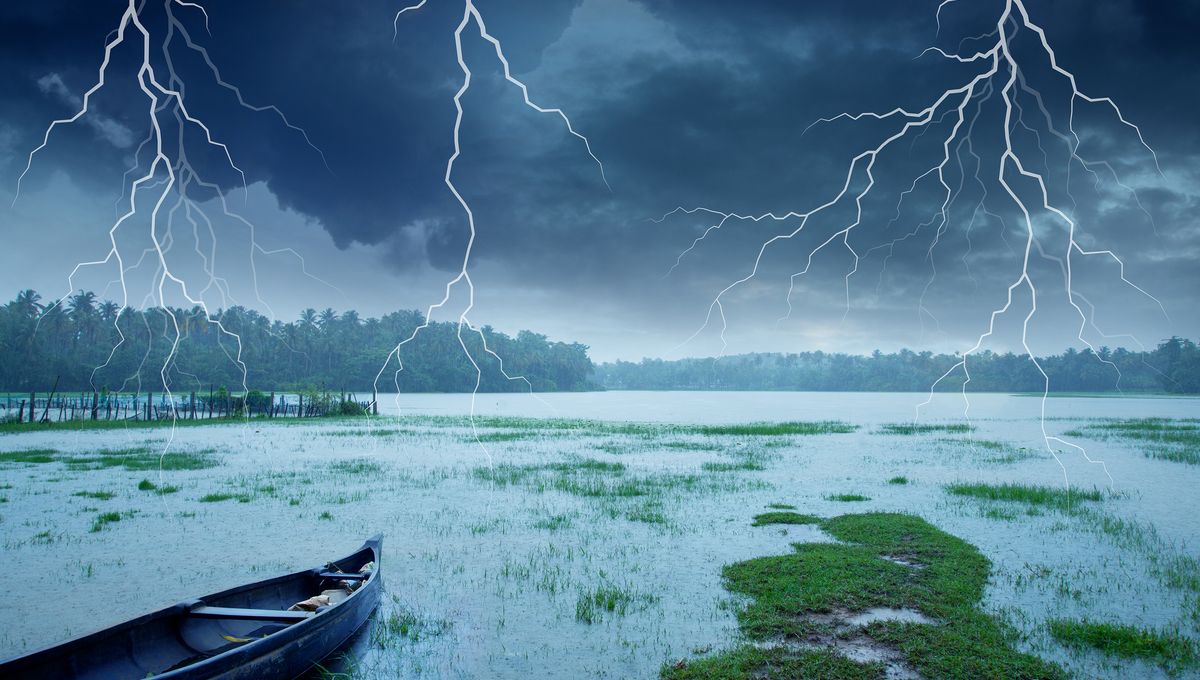
Reportedly, fishing is one of the most common activities for people to be doing when they’re struck by lightning. But what does this mean for fish, who famously spend their entire lives in prime fishing locations? Despite what cartoons would have you believe, when lightning strikes a lake, all its once-living contents won’t instantly float to the surface belly-up. Well, they probably won’t.
This is because when a bolt of lightning hits a body of water the current travels along the surface rather than penetrating deep into the liquid. The same effect is seen when lightning strikes a car, or another conductive object; the current flows across the surface rather than through the strike point.
This is called the skin effect and is the principle behind Faraday Cages – an enclosure that shields its contents from electrical current. The effect is even seen when humans are struck by lightning, referred to as flashover, which can leave people with intricate surface burns on their skin called Lichtenberg figures.
When lightning strikes a lake or ocean, the current is only likely to affect living things that are near the surface at the time. However, it’s not clear the exact depth each strike will penetrate, so best not to rely on your diving abilities when taking a stormy swim.
Water is also great at dissipating heat, so despite a lightning strike reaching temperatures nearly five times hotter than the surface of the Sun at 27,760 degrees Celsius (50,000 degrees Fahrenheit), when it hits cold water that temperature quickly dissipates, cooling the effect of the strike. This means the water will not start to boil when it’s hit by lightning – yet another thing cartoons lied about.
We humans aren’t, however, afforded the same safety as fish when it comes to swimming during a thunderstorm. As it’s likely we’ll be breaching the water’s surface, if lightning strikes, we’ll definitely feel it.
Current from a lightning strike on the water’s surface can travel between 10 and 100 meters (32–328 feet) or more, depending on the power of the strike, so you don’t even necessarily need to be near it to suffer damage from its potentially 10 million volts of energy.
A popular recommendation for determining whether or not it’s safe to be in the water during a storm is the 30/30 rule. Applying a flash-to-bang principle, the 30/30 rule suggests that when you see the first flash of lightning, if the accompanying thunderclap is heard at or before 30 seconds then the storm is close enough to pose a risk. The closer the thunder and lightning are to each other, the closer the storm is. It’s also advised that people wait for 30 minutes after the last flash is seen before entering the water again.
Flash-to-bang principles are based on the speed sound and light travel. Sound travels at 343 meters (1,125 feet) per second, approximately 1 mile every 5 seconds, while light travels at 300,000 kilometers (186,411 miles) per second. If you count the number of seconds between the flash of lightning and the clap of thunder, then divide the number by three, you will get the storm’s distance from you in kilometers. For miles, divide by five.
But the best and most math-free method of staying safe in the water is to simply not swim during a storm.
Source Link: If A Lightning Strike Hit A Lake, Would It Kill The Fish?